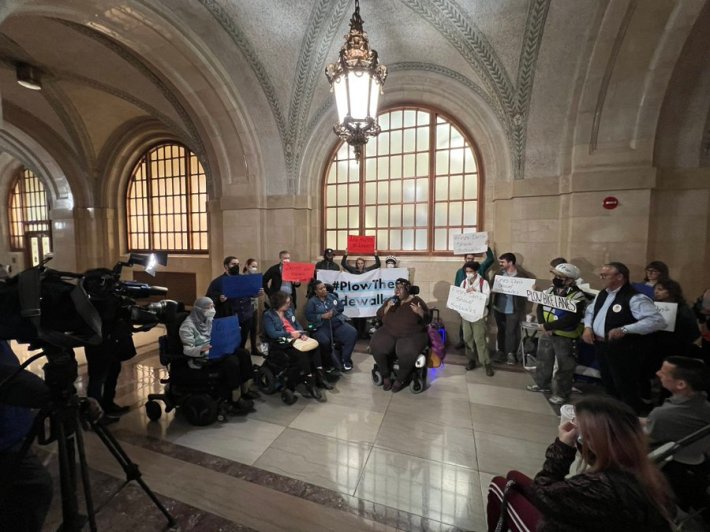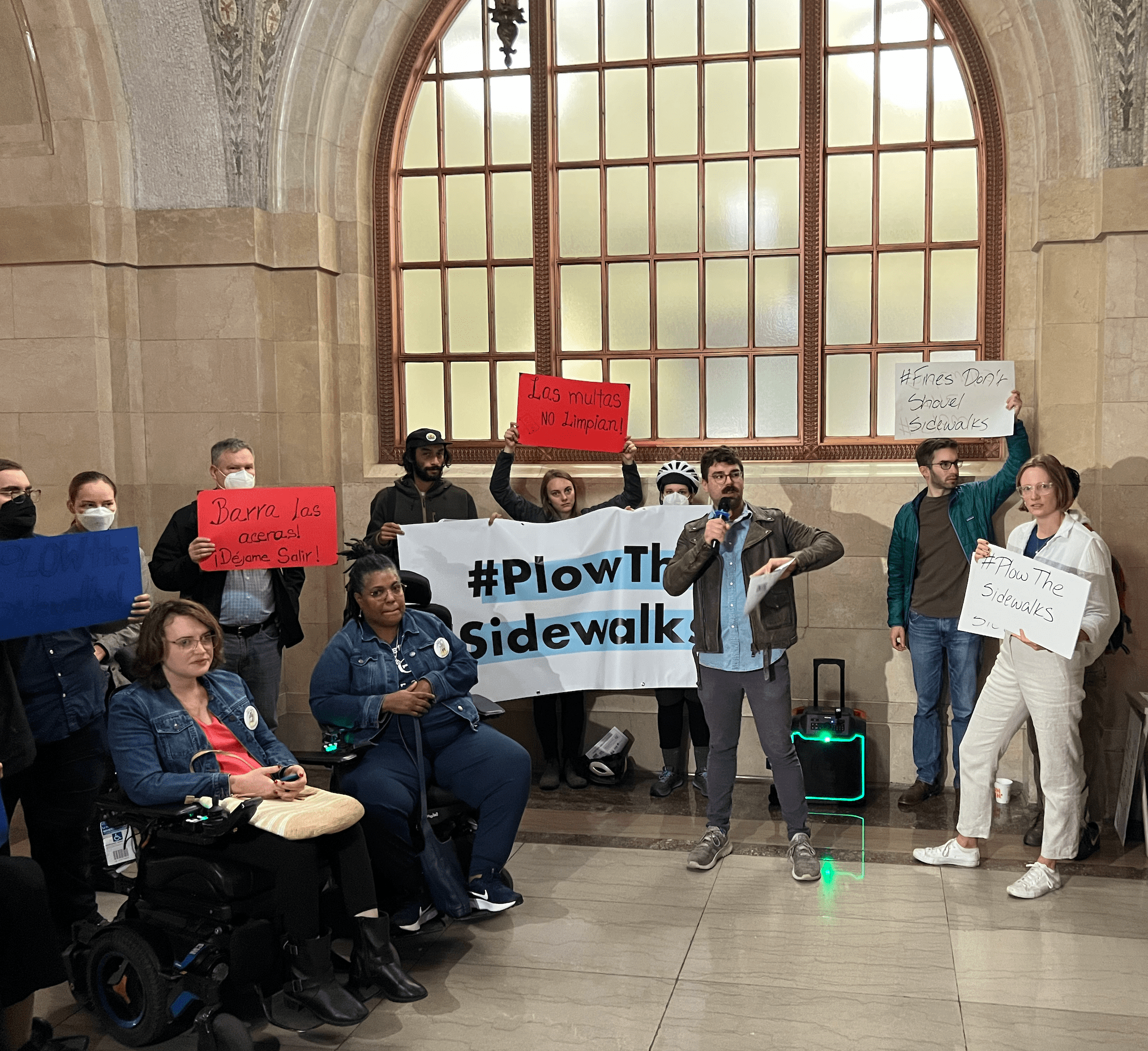On Wednesday morning a spirited group of people, including members of the safe streets advocacy group Better Streets Chicago (I'm a co-founder), the disability rights organizations Access Living, and supporters held a rally for the Plow The Sidewalks municipal sidewalk snow removal pilot.
One of the lead organizers for Plow the Sidewalks, Michael Podgers addressed the crowd stating that Chicagoans deserve year-round access to a fundamental component of our transportation system: sidewalks. Nearly a third of Chicagoans do not have access to a car and many of their trips are taken by the CTA. Without universal access to the sidewalks, many people are impeded from taking transit trips within the winter months or at the very least have their journeys to and from transit made more difficult due to sidewalks filled with snow and ice.
Access Living, a disability rights advocacy group, was an early supporter and partner in the Plow the Sidewalks campaign. Some of their constituents shared their experiences navigating the city during the winter. One woman, Kathleen, described being stuck in the snow for over an hour because a business did not shovel the snow in front of their property. She added that those with visual impairments face difficulty in the winter as well. “The city should plow the sidewalks in the same way they plow the streets.”
“A world-class city needs to have clear sidewalks year round,” said Ald. Gilbert Villegas (36th.) Referencing signs created by supporters that read read “Fines don’t shovel,” Villegas said he agrees that financial tickets are not an effective way to ensure sidewalks are clear in the winter. “If we can’t find a million dollars [within a $16 billion budget] for this, we might as well shut the door.” He said he plans to introduce an ordinance for the pilot program.
My staff will be putting forward an ordinance to identify areas and an appropriation amount to provide for a pilot to #plowthesidewalks in the city. Should be ready for introduction this month.
— Gilbert Villegas (@gilbert36ward) November 2, 2022
Jim Merrell of the Active Transportation Alliance talked about the group’s support for the campaign. He told a story of seeing a neighbor using a tiny plow to clear the sidewalk on his block. “If it’s possible on my block, I know it’s possible on yours.”
Another Access Living constituent shared her experience living on the two-block stretch between the Cermark-Chinatown Red Line station and the Cermak Green Line stop and having to travel in the street to reach either 'L' stop. At times she has gotten stuck in the street and has had dozens of people pass by her without offering to help. She also noted that visitors to McCormick Place can often be seen pulling their luggage through the snow and slush. She urged the city to take over sidewalk clearance to make it safer for people like her to navigate the city.
Safe streets advocate Jeremy Frisch talked about his family’s experience navigating the snow in the winter. At the beginning of the pandemic, his family took up walking for recreation and wanted to continue it into the winter. They noticed that there were noticeably fewer people walking with their young children in the winter. Through conversations with neighbors they discovered many people with children gave up on going for walks during the colder months due to difficulty navigating the snow and ice. Jeremy’s own wife stopped going on walks alone with her children because she could only navigate pushing the stroller with her husband or mother’s help.
Frisch noted the city’s current policy of trying to keep the sidewalks cleared via ticketing of noncompliant property owners doesn’t always lead to the sidewalk being cleared, and the fines are inequitable for those who are physically unable to shovel snow themselves but can't afford to pay someone for sidewalk clearance. “Given that close to 20,000 311 requests regarding snow on the sidewalk were submitted in the last three years, this shows that impassable sidewalks are a real issue. Given how cumbersome it can be to fill out a 311 request, we’re likely underestimating just how big a problem this issue is. 100 percent of Chicagoans use the sidewalks, and it's time for Chicago to do what's right and take the first step towards municipal snow and ice removal.”

Lenny Sanchez of the Independent Driver’s Guild, an advocacy group for ride-hail and food delivery gig workers said clear sidewalks are important to gig workers given that many of them have to use the sidewalk to make pickups and drop-offs. They sometimes slip on the sidewalk as they’re trying to deliver an order. Morevover, some Uber and Lyft riders have slipped getting in and out of vehicles.
Access Living constituent Cherlnell Lane, shared her experience of being unable to leave her home during the winter months due to impassable sidewalks. She said she’s a very active person and snow on the sidewalks can impede her ability to go to work, get groceries, access entertainment venues, and more. “This is not just a disability issue, this is a community issue. [Impassible sidewalks] stop. everyone from getting to where they’re going. As Chicagoans, we should be able to travel wherever we want to travel no matter the season. Think about if you were unable to leave the premises of where you stay. This is the reality for many people when the sidewalks are not shoveled. We need to put the effort, time, and funding in to plow the sidewalks and make the city accessible for everyone.”
The rally concluded with Better Streets Chicago organizer Michael Podgers encouraging folks to take flyers about the Plow the Sidewalks campaign with them to distribute among neighbors, friends, colleagues, and to reach out to their alders to encourage them to support the pilot.
After the rally, a few people went to give public comment for the City Council budget committee hearing. Two of the previous speakers for Access Living gave testimony and one other disabled person shared her experience of having her wheelchair’s motor blowing out during her struggle to get out of thick snow. Jeremy Frisch provided testimony as well.
When it was my turn to speak, I asked the budget committee to analyze what the city gained from its $12.5 million expenditure for the Chicago Moves program in which a majority of the funds for transportation costs relief were spent on paying people to drive via free gas cards. If the city can afford to fund gasoline, surely it can afford a $750,000 municipal snow clearance pilot (read details of the proposal here) that would help hundreds of Chicagoans get where they need to go safely. In retrospect, I wish I had also mentioned the need for a dedicated fund for bike lane maintenance, most especially in the winter months.
Right now one-fifth of City Council members supports the pilot program. If you’d like to see your alder added to the list of supporters, there’s an email campaign to get more Council members on the list of supporters.






